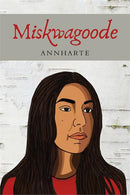Description
Miskwagoode is a book of poems by Annharte (Marie Baker) who is Anishinaabe, Little Saskatchewan First Nation, Manitoba. Taken from the Anishinaabe word for “woman,” Miskwagoode is a lyrical portrayal of unreconciled Indigenous experience under colonialism, past and present.
Annharte is Miskwa, and so is Annharte's mother, who disappeared when the author was a girl. Miskwagoode is Annharte's book about her mother loss, her “mothermiss,” about all the women “buried in common enough/ cross-generational graves.”
Laced with humour and resilience but also hard-earned wisdom (“ominous progress ahead”), Annharte's fifth collection encompasses the poet's experiences as an Anishinaabe Elder, now experiencing the still-endemic inequalities of persisting colonialism, “witness not survivor.”
In her sly, cheeky riffs on life behind the “buckskin curtain” at the margins of settler society, Annharte talks about granny circles, horny old guys, and getting your hair done — the belonging her community offers. But she sets these poems about rez life against the background radiation: the poverty and the sickness, despair, violence, sexism, and sexual abuse that flow from unequal relationships.
Miskwagoode concludes with “Wabang,” a suite of short poems comprising Annharte's own thumbnail transcontinental Indigenous mythology.
Annharte is Miskwa, and so is Annharte's mother, who disappeared when the author was a girl. Miskwagoode is Annharte's book about her mother loss, her “mothermiss,” about all the women “buried in common enough/ cross-generational graves.”
Laced with humour and resilience but also hard-earned wisdom (“ominous progress ahead”), Annharte's fifth collection encompasses the poet's experiences as an Anishinaabe Elder, now experiencing the still-endemic inequalities of persisting colonialism, “witness not survivor.”
In her sly, cheeky riffs on life behind the “buckskin curtain” at the margins of settler society, Annharte talks about granny circles, horny old guys, and getting your hair done — the belonging her community offers. But she sets these poems about rez life against the background radiation: the poverty and the sickness, despair, violence, sexism, and sexual abuse that flow from unequal relationships.
Miskwagoode concludes with “Wabang,” a suite of short poems comprising Annharte's own thumbnail transcontinental Indigenous mythology.


